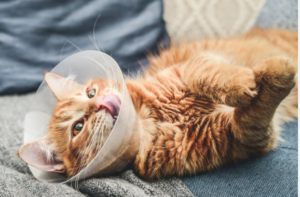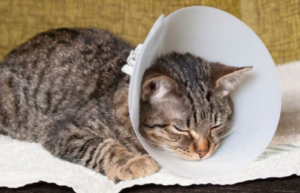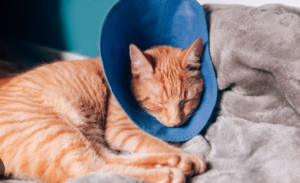Neutering is one of the most important decisions cat owners make to improve their pet’s quality of life and reduce undesirable behaviors. This common surgical procedure, performed by a veterinarian, involves removing the testicles of a male cat, rendering him infertile.
But what exactly happens before & after neutering? How does it impact a cat’s behavior and recovery? Let’s dive into everything you need to know about male cats and neutering.
What Happens Before Neutering?

Before neutering, a male cat’s behavior is strongly influenced by testosterone, which drives instinctive actions that may be challenging for owners to manage.
Common Pre-Neutering Behaviors
Territorial Spraying
Male cats often spray urine to mark their territory. The smell is pungent and can be overwhelming indoors. This behavior is hormonal and signals dominance or mating readiness.
Roaming Behavior
Unneutered males are notorious for roaming in search of a mate. This not only increases their risk of getting into fights with other cats but also exposes them to dangers like traffic accidents and predators.
Aggression
Male cats can exhibit aggressive tendencies toward other cats or even their owners, especially when competing for mates. This behavior can make socialization more difficult.
Excessive Vocalization
Loud meowing or yowling, particularly during the night, is a common behavior in intact males. It’s often triggered by their instinctive desire to mate.
Preparing for the Surgery

Fasting Before Surgery
Your veterinarian may ask you to withhold food for 8-12 hours before the surgery to minimize the risk of complications under anesthesia.
Health Checkup
A pre-surgical checkup ensures your cat is healthy enough for the procedure. This might include a physical exam and blood work.
Calm Environment
Keep your cat calm before surgery to reduce stress. Avoid introducing new pets or changing their routine close to the surgery date.
You may love this article: Orange Bengal Cat
Behavioral and Physical Recovery After Neutering
After the surgery, your cat will need time to recover. While the procedure is relatively simple and safe, proper post-operative care is essential for a smooth recovery.
Immediate Post-Operative Care

Rest and Isolation
Provide your cat with a quiet, comfortable place to rest after surgery. Avoid letting other pets or children disturb him during recovery.
Monitor the Incision Site
Check the surgical site daily for signs of infection, such as swelling, redness, or discharge. A clean and dry incision site is a sign of proper healing.
Activity Restriction
Cats love to jump and play, but these activities can disrupt the healing process. Use a recovery cone (e-collar) if your cat tries to lick or bite the incision area.
Feeding and Hydration
Some cats might have a reduced appetite for the first 24-48 hours. Encourage drinking water and offer small, easily digestible meals.
Behavioral Changes Post-Neutering

Reduction in Territorial Spraying
Most neutered male cats stop spraying altogether or significantly reduce this behavior within weeks of surgery.
Decreased Roaming
Neutering eliminates the hormonal drive to roam, making your cat more likely to stay close to home.
Lower Aggression Levels
Neutered males tend to be calmer, less aggressive, and more accepting of other cats and people.
Increased Affection
Many owners notice their neutered cats becoming more affectionate, as they no longer feel the hormonal urge to assert dominance or compete for mates.
Long-Term Benefits of Neutering
Aside from behavioral improvements, neutering offers several long-term health and lifestyle benefits:
Prevention of Testicular Cancer
Since the testicles are removed, the risk of testicular cancer is eliminated.
Reduced Risk of Prostate Issues
Neutered cats are less likely to develop prostate diseases, including infections and enlargement.
Lower Risk of Injury
Cats that roam and fight with other males are prone to injuries and infections. Neutering reduces this risk significantly.
Better Socialization
Neutered males are generally friendlier and more sociable with other pets.
Risks and Considerations
While neutering is a safe and routine procedure, it’s important to be aware of a few considerations:
Anesthesia Risks
Though rare, some cats may have adverse reactions to anesthesia. Always discuss your cat’s medical history with the vet beforehand.
Weight Gain
Neutered cats may have a slower metabolism, making them prone to weight gain. Monitor their diet and provide regular exercise to maintain a healthy weight.
Persistent Behaviors
If a cat is neutered later in life, some behaviors (like spraying) may not disappear entirely due to learned habits.
Frequently Asked Questions
1. How Long Does It Take for a Male Cat to Recover from Neutering?
Most cats recover within 10-14 days. However, it’s essential to follow your vet’s advice and monitor for any signs of complications.
2. Will Neutering Stop My Cat from Spraying?
In most cases, yes. If spraying continues, it might be due to stress or habit rather than hormones.
3. What Age Should I Neuter My Male Cat?
The ideal age is around 4-6 months, but adult cats can be neutered as well. Early neutering prevents many unwanted behaviors.
Conclusion
Neutering your male cat is a responsible and beneficial decision for both his health and your peace of mind. By understanding the behavioral changes and providing proper pre- and post-operative care, you’ll ensure a smoother transition and a happier feline companion.
Always consult your veterinarian to address specific concerns and make informed decisions about your cat’s well-being.
